Nov 18, 2025 – Religious Leaders’ Meeting (Yeongdong, Chungbuk), Happy Dialogue (8) Goyang City
Hello. Today is the day scheduled for a religious leaders’ meeting for national reconciliation and peace in Yeongdong, Chungbuk Province.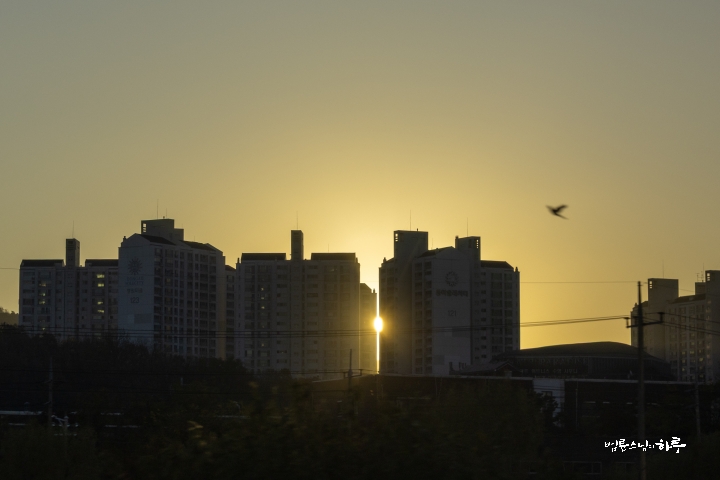
After successfully completing yesterday’s Happy Dialogue Dharma Q&A in Jeju Island, Sunim finished his morning practice and meditation, left his accommodation, and headed to Jeju Airport. After completing check-in procedures, he departed from Jeju Airport at 8:20 AM, flew for 50 minutes, and arrived at Cheongju Airport at 9:10 AM. He left the airport and immediately headed to Yeongdong, Chungbuk Province for the religious leaders’ meeting.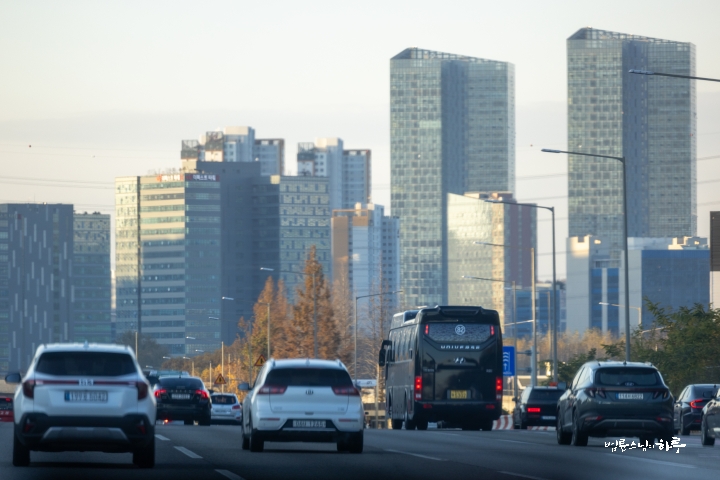
He arrived at Yeongdong Station at 11:10 AM and waited to greet the religious leaders coming down by train from Seoul. The train arrived 5 minutes late at 11:35 AM at Yeongdong Station.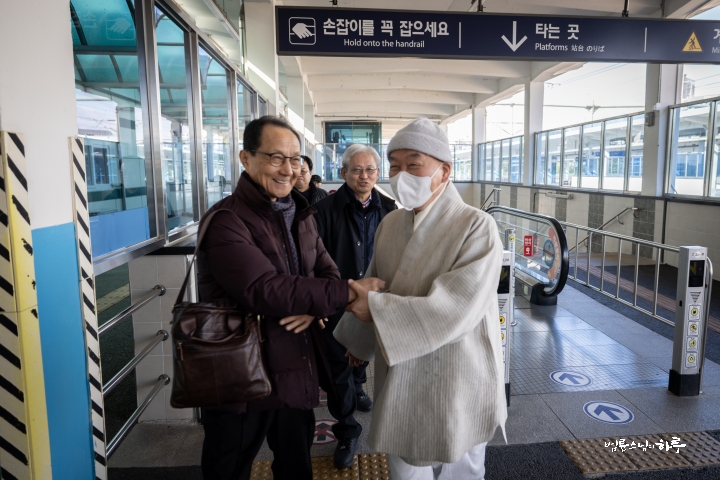
“Welcome.”
“Where did the priest go? Why is Sunim here to greet us?”
“The priest is busy cooking right now.” (Laughter)
Father Kim Hong-jin has been farming in Yeongdong County, Chungbuk Province, and has often expressed his wish to invite religious leaders to his farm for a meal. Today, that gathering finally took place.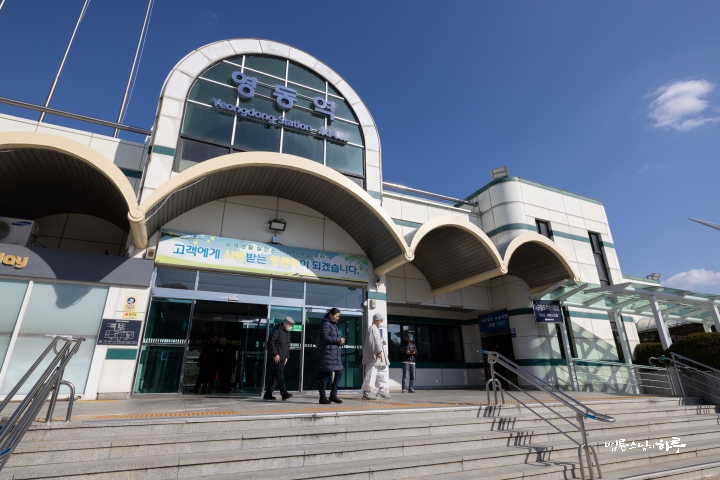
Everyone got in the car together and headed to the farm where Father Kim Hong-jin was farming. In the car, Sunim expressed his concern.
“Isn’t it too cold to eat outside? I’m worried that the elders might catch a chill.” 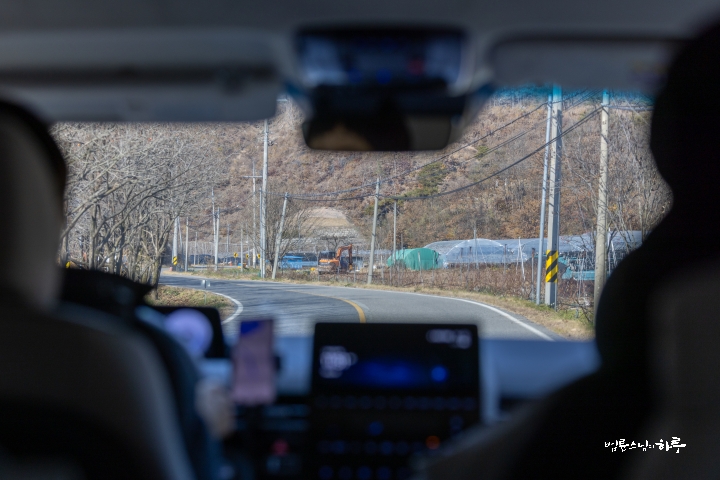
Following country roads deep into the mountains from Yeongdong-eup, Father Kim Hong-jin’s farm appeared. Fortunately, when they got out of the car, there was a prefab house on one side of the farm. The priest, busy preparing food, warmly welcomed the religious leaders.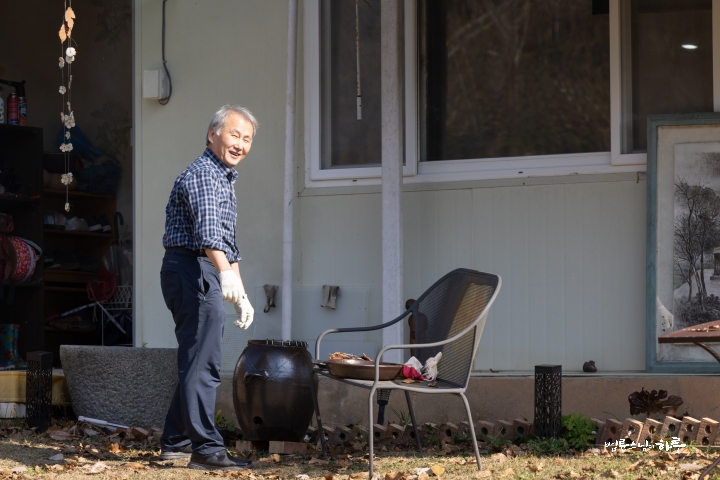
“Welcome. This is my farm.”
After touring the farm, they entered the prefab house. After looking around every corner, Sunim said with a smile.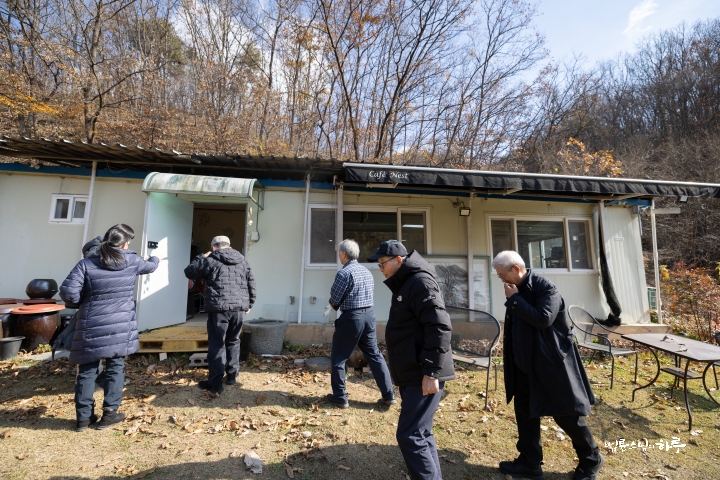
“Everything’s good, but there’s just one thing missing.”
When everyone looked curious, Sunim continued.
“It shows that you live alone.” (Laughter)
They all laughed heartily, shook hands with the priest, and sat down.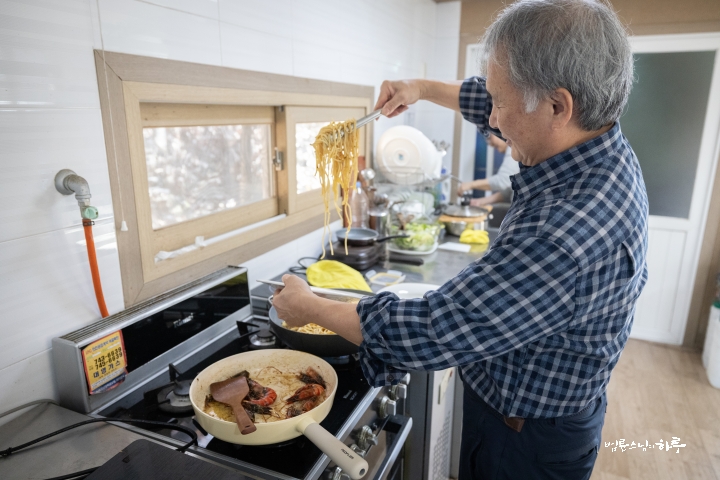
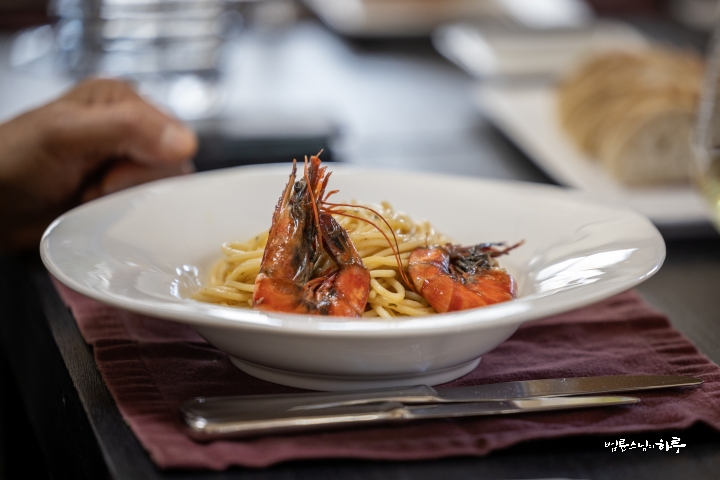
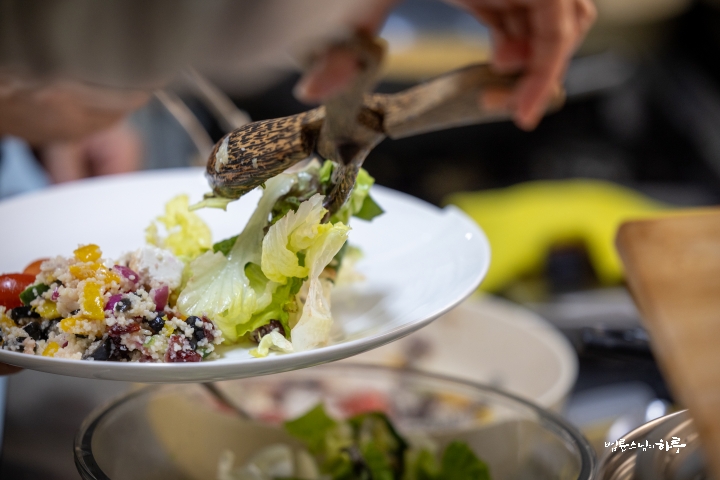
Father Kim Hong-jin personally cooked and prepared a generous meal.
“Let’s have the Gyoryeong lead the meal prayer today.”
At the priest’s request, Park Nam-soo Gyoryeong, the chair of the religious leaders’ meeting, led the meal prayer.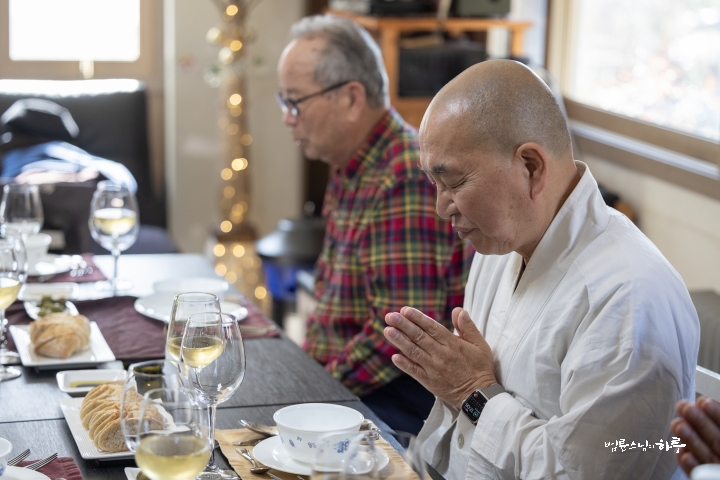
“May Hanulnim be moved, may our Teacher be moved, may our ancestors be moved. Today’s luncheon meeting was held at the invitation of the respected Father Kim Hong-jin in Yeongdong, Chungbuk Province, where the mountains are beautiful, the water is pure, and the energy is good. We thank Father Kim Hong-jin for personally preparing all the food. I sincerely pray that the religious leaders’ meeting for national reconciliation and peace will become even more harmonious and receive energy from this place for peace on the Korean Peninsula.”
“Amen!”
When drinks were served, the priest gave a toast.
“For the world and all of us!”
They had warm conversations while eating. First, the priest introduced the farm.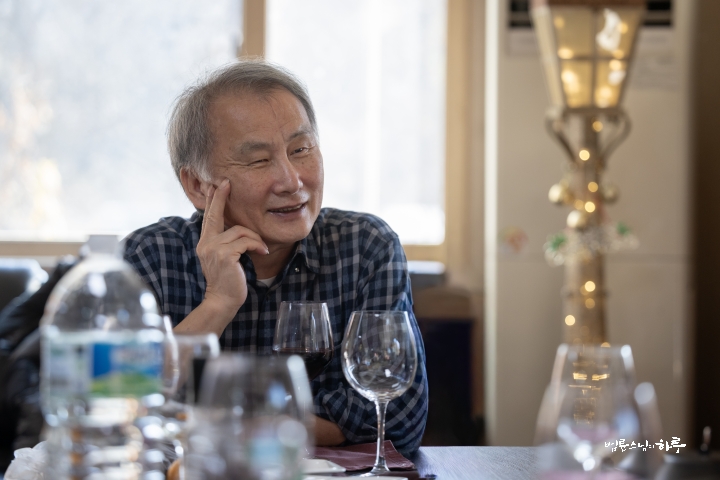
“This used to be a cowshed. The landowner asked me if I wanted to try farming here, so I came to survey the place and found it so cozy and nice. So I’m experimenting with sustainable agriculture called permaculture here. You need to prepare the soil for about three years first. The process is a bit difficult, but once the soil is ready, you can farm using the peaceful farming method without pesticides. Right now, I’m in the process of preparing the soil, so I couldn’t serve you with what I’ve grown myself. From next year when I start harvesting, I’ll serve you with food I’ve grown myself. Also, there’s no phone signal here. So this is my liberation zone.”
Sunim said with a smile.
“You say it’s peaceful farming, but isn’t it just farming for lazy people?” (Laughter) 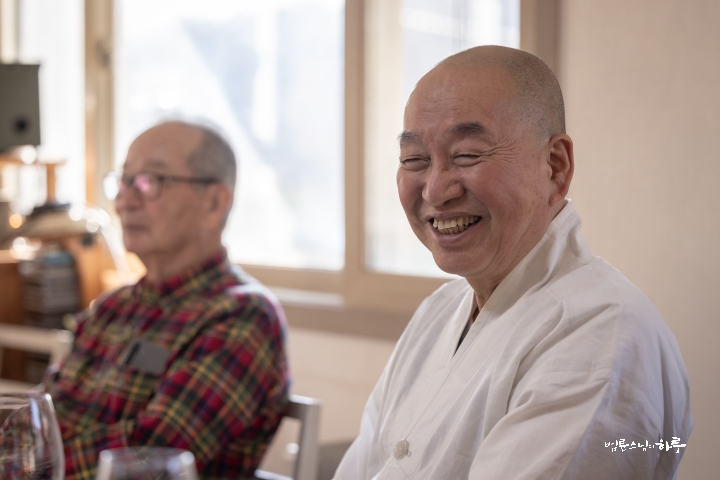
Gyomu Kim Dae-seong also said with a smile.
“The priest is living and practicing in the mountains like Sunim.”
Father Kim Hong-jin replied.
“That’s why this shack is called Hongjinam. It’s a hermitage where Kim Hong-jin lives.”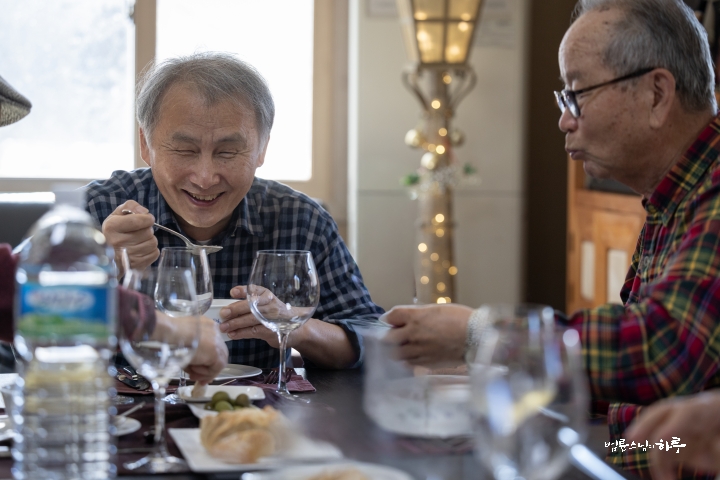
Gyoryeong Park Nam-soo also shared his thoughts with a smile.
“Father Kim Hong-jin is a great asset to the Catholic Church, but he declined high positions and came here to farm, which I think is wonderful. Leaders should not be greedy. It looks really good that you’ve given up greed and come to Yeongdong to live with the land. But there’s one drawback – it seems you’ll have to weed quite a lot.” (Laughter)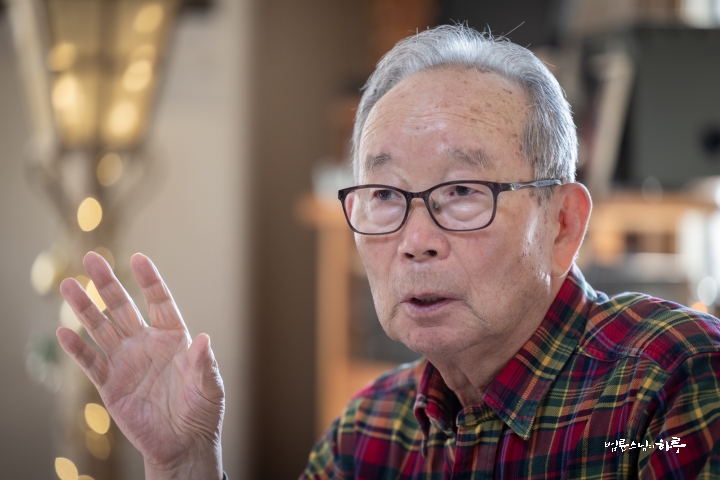
While talking about farming, Bishop Park Kyung-jo added a comment.
“There’s a reason I pray for Venerable Pomnyun Sunim. It’s because Sunim works hard farming and goes directly to poor countries to help people. I keep thinking, ‘Sunim is doing the work I should be doing.’ I’m praying for Sunim with a spirit of solidarity.”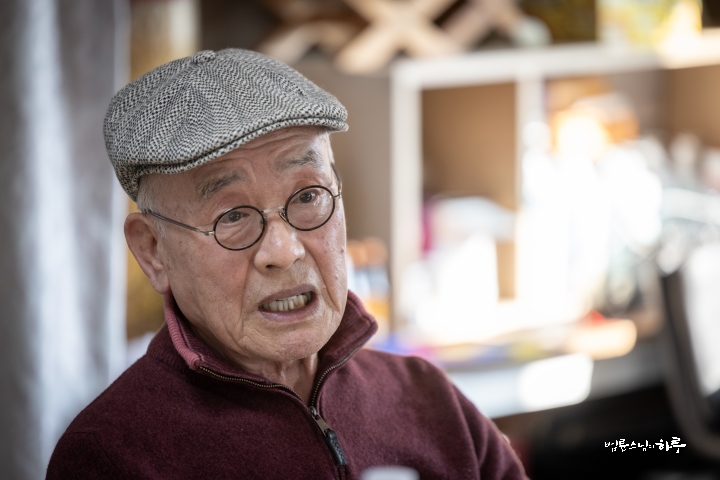
Sunim replied with a smile.
“Please pray more, Bishop. That way I can continue my activities for a long time.”
They then continued their conversation on the theme of peace on the Korean Peninsula and national unity. Pastor Park Jong-hwa expressed his concerns about recent media reports.
“Korean society seems to be increasingly heading toward extreme polarization. The middle ground seems to be disappearing. There’s also no presence of elders who can maintain balance.”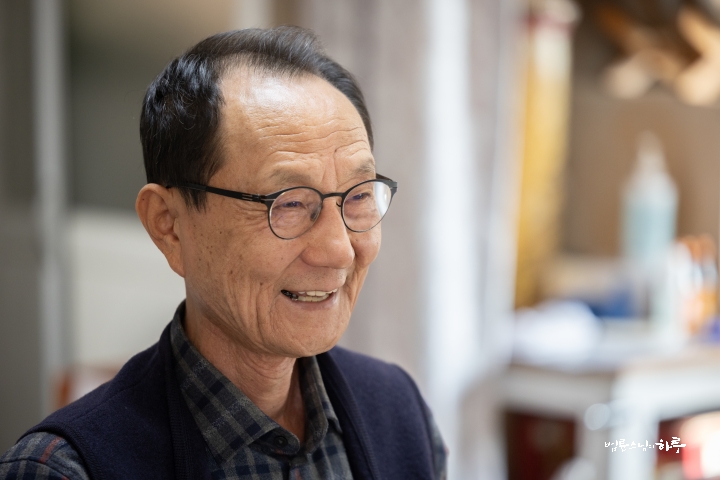
Sunim agreed and said.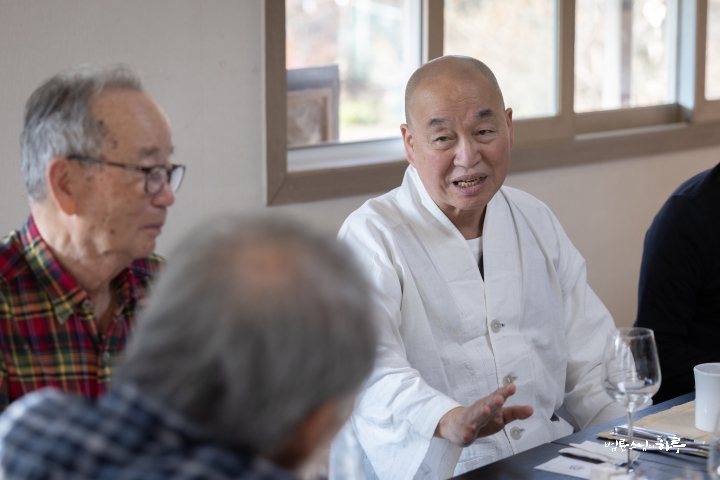
“That’s right. While everyone agrees that national unity is an important task, solutions are hard to find. Leaders of both parties don’t hesitate to make extreme statements and continue with high-level rhetoric. In this climate, many politicians have either fallen silent or are playing politics by watching the reactions of their hardline supporters.
How Can We Achieve National Unity When Politics Is Being Pulled to Extremes?
I personally meet with various politicians and ask them to exercise restraint, and most personally agree with the sentiment. However, since maintaining their political positions takes priority, they ultimately resort to attacking or resisting their opponents. One side tries to carry the frame of ‘eradicating insurrectionist forces’ until next year’s election, while the other calculates that continuously pressuring the current government will eventually turn public opinion in their favor.
As political strife becomes strategic like this, no matter how much advice is given from the outside, persuasion isn’t easy. But I’m concerned whether this situation can really be resolved even if our religious leaders’ meeting issues a statement and takes action.”
The religious leaders freely shared their thoughts.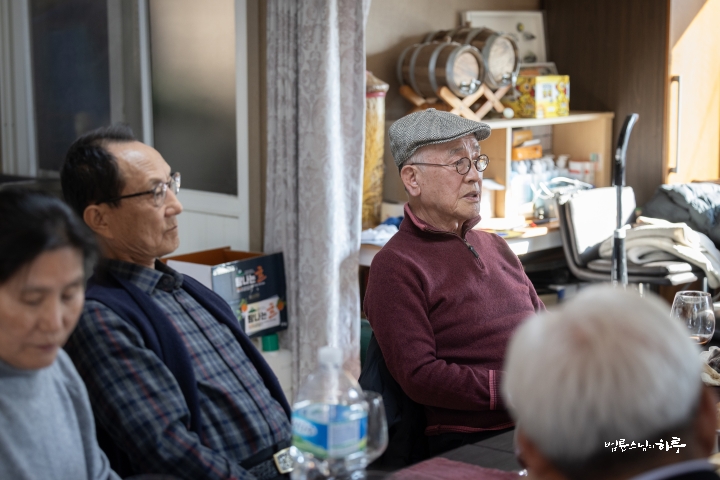
“I think it’s a continuous process of not giving up and making efforts to keep dialogue going. South Africa also had tremendous confrontation and division, but they eventually achieved unity.”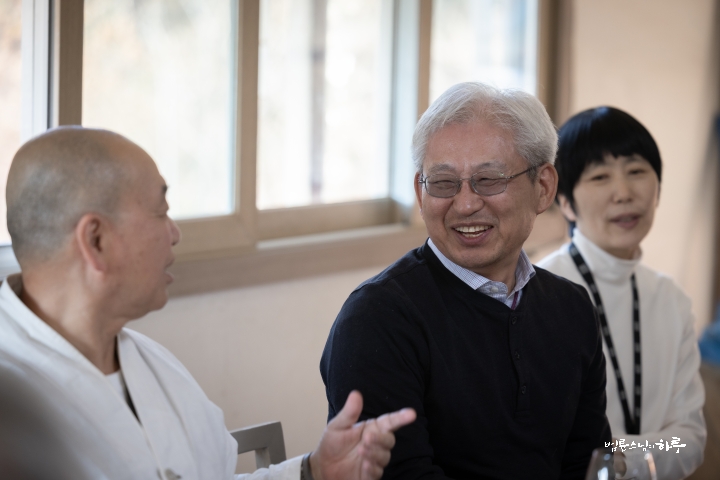
“Recently, we invited Sri Lankan religious leaders and learned how they exercised social leadership in overcoming 30 years of civil war, which was very inspiring. So next year, it would be good if we could go to Sri Lanka and see firsthand how they achieved reconciliation.”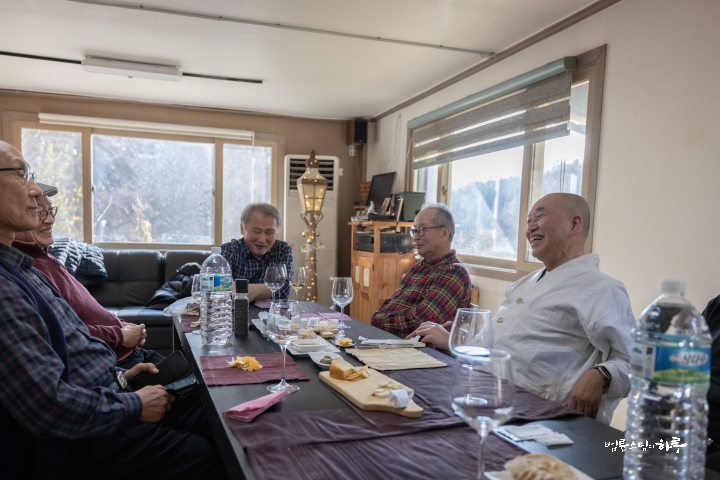
“This division and confrontation isn’t just happening domestically but is a global phenomenon. So we need to play a role in creating a model that can be an alternative not just for our country but for the whole world. I think we need to continue dialogue on that theme.”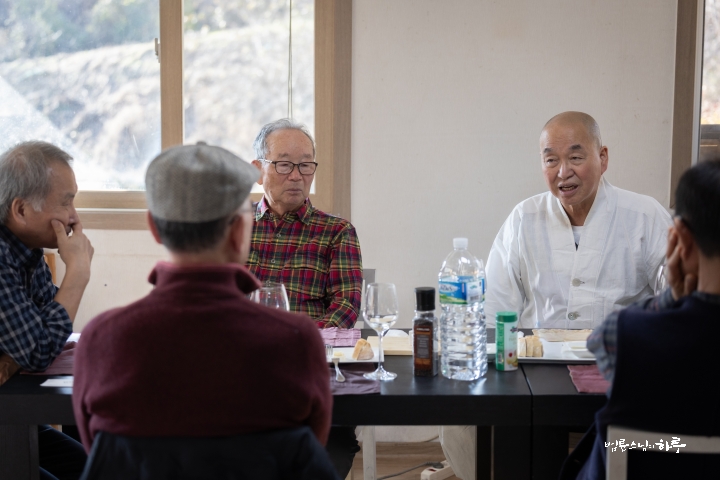
There was great concern about the increasingly severe confrontation between the ruling and opposition parties. They concluded the meeting by agreeing to have a more in-depth discussion next month about what role the religious leaders’ meeting could play in achieving national unity.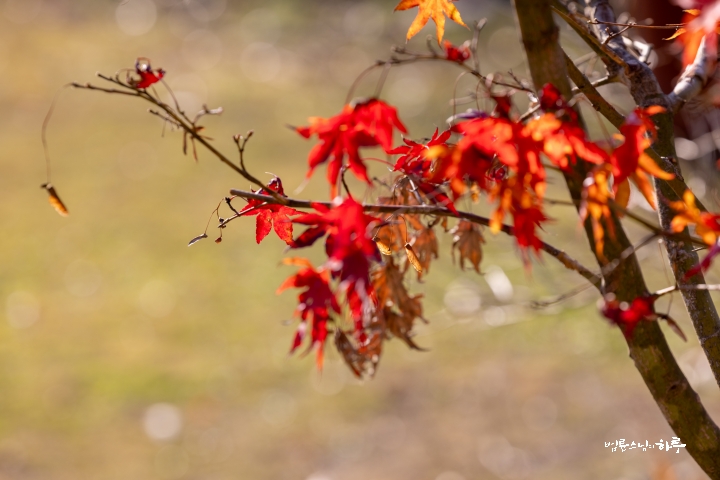
Everyone went out to the yard where warm sunlight was shining and took a commemorative photo. Behind them, the words “Today, the Most Shining Day of My Life” fluttered in the wind.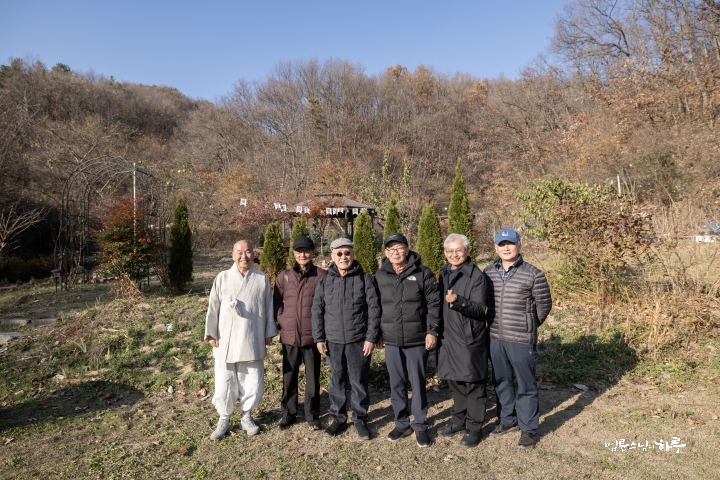
As train time approached, they hurried to Yeongdong Station.
“Father, thank you for the meal.” 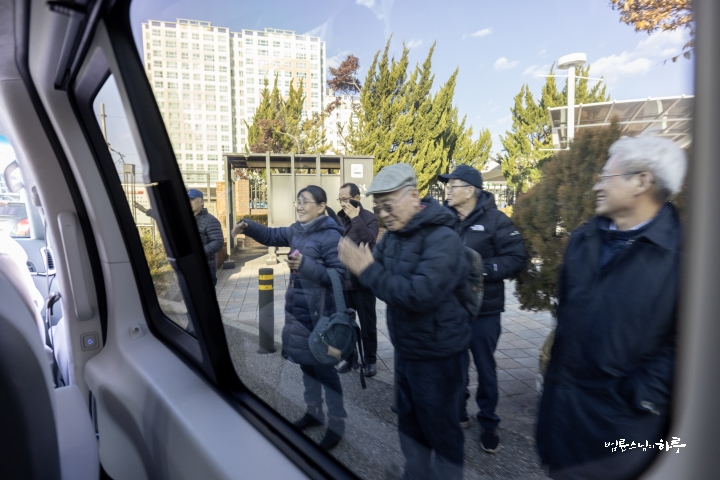
After expressing his gratitude to the priest, Sunim left Yeongdong County and headed to Goyang City, Gyeonggi Province for his next schedule. The religious leaders took trains back to their respective places.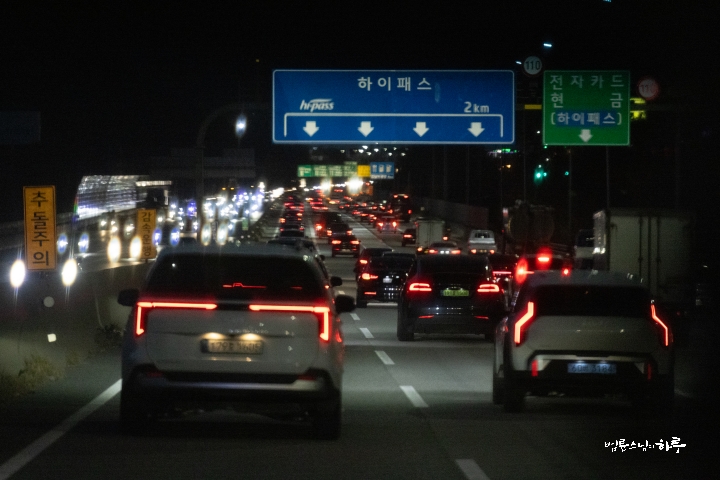
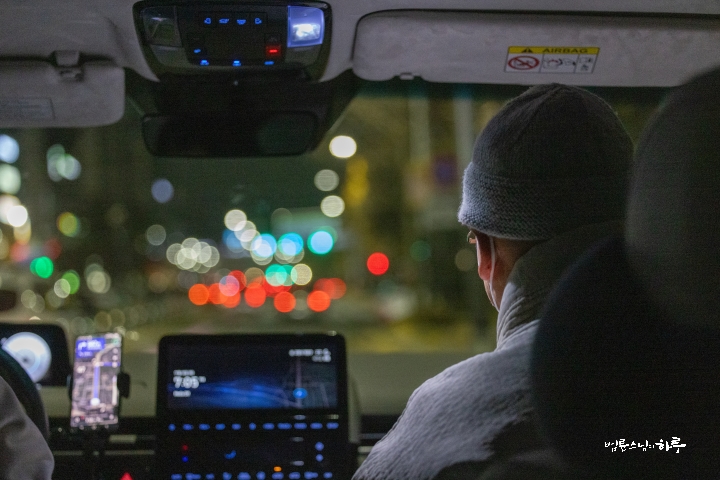
After a 4-hour drive, they entered Goyang City. Due to rush hour traffic, he barely arrived at the venue at 7:20 PM, just before the lecture was scheduled to begin.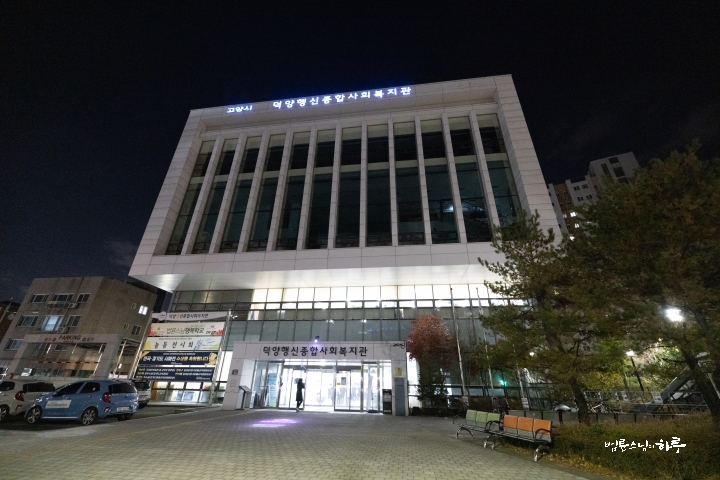
Today’s lecture was held at the Deokyang Haengsin Comprehensive Social Welfare Center. It’s a complex community space that provides various welfare and educational services such as lifelong learning, family counseling, and sports centers for local residents. Today, Venerable Pomnyun Sunim’s Dharma Q&A was held here.
When Sunim arrived, the Happy Citizens who prepared the lecture and the citizens waiting to enter the venue warmly welcomed him.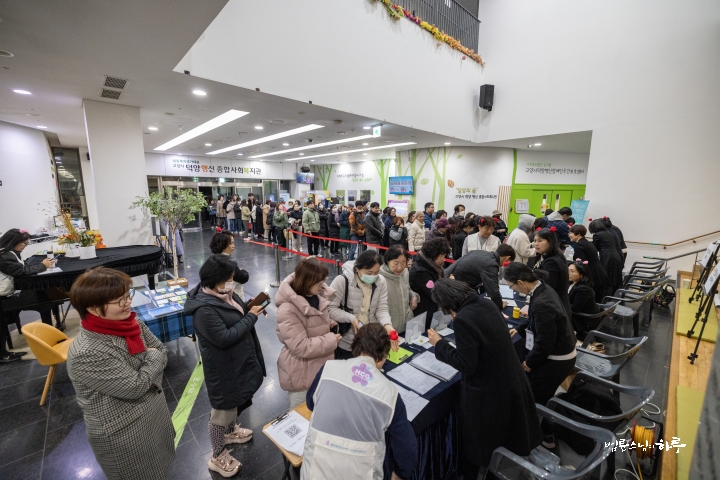
At 7:30 PM, the indie band “Magic Donkey” enthusiastically performed two songs as a talent donation. While they sang “Taking the Train” and “Heaven, Earth, and Human” consecutively, the atmosphere in the venue heated up.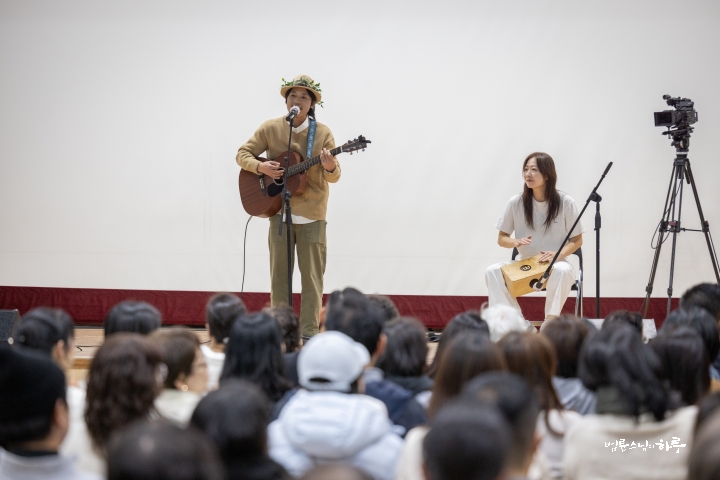
The host who took the stage was KBS announcer Jang Sae-byeol. She volunteered her time today as a talent donation.
“Let’s welcome Venerable Pomnyun Sunim with a big round of applause.”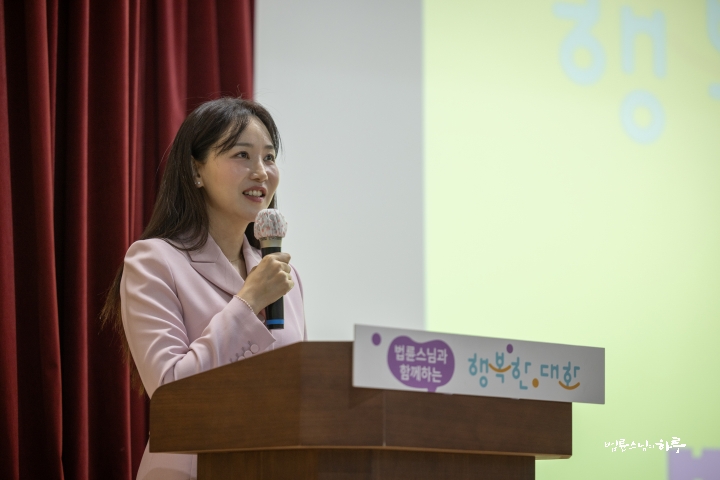
When the introduction video ended, Sunim walked onto the stage with announcer Jang Sae-byeol’s resonant voice.
Sunim greeted the more than 600 Goyang citizens who filled the venue by bringing his palms together, and then began the conversation. He emphasized that what Korea needs today is not merely a New Village Movement, but a New Mind Movement.
It’s quite chilly, isn’t it? These days it feels as though autumn has disappeared and we jump straight from summer to winter. I’ve had an exceptionally long day today. I left Jeju in the morning, passed through Cheongju, stopped briefly in the Yeongdong area, and then came all the way here to Goyang. I’ve truly been on the road the entire day.

In life, we often find that one thing is good while another feels lacking. Yet we tend to cling to what’s lacking, focusing on complaints and self-pity. We envy what others appear to have on the surface, while mistakenly believing that we alone are struggling. But if you look closely, human life is not so different from the lives of small animals like squirrels or rabbits. Squirrels and rabbits survive perfectly well in the wild without anyone’s help. So how can a human being—much larger and far more intelligent—say “I can’t live like this” while living not in the wilderness but among people? In the end, the real issue is the mind that thinks, “This is hard.” When you think something is hard, everything feels hard; when you see it as “no big deal,” it truly becomes no big deal. I hope you will try to look at life with a broader perspective.
Someone once asked me, “If life is just going to be painful anyway, why should we live?” And I replied, “We just live.” If you ask a squirrel why it lives, what could it possibly say? It lives because it was born—there’s no grand reason needed for a squirrel to live. Then why do we humans insist that our lives must have some special reason? In truth, such a reason doesn’t exist. We simply live. But since we are living anyway, there’s no need to live in a painful way. It is far better to live without suffering.

Happiness is living without suffering. Many people mistake ‘pleasure’ for happiness, but it is the way of this world that pleasure inevitably brings suffering. When we use pleasure as our standard, the shadow of suffering naturally follows. Life has both joyful and difficult times. Do squirrels living in the mountains have particularly joyful experiences? While they may appear happy to us, they are simply living their lives. A state that is neither particularly joyful nor particularly painful – that state is happiness.
Health works the same way. Being strong doesn’t mean being healthy; not being sick means being healthy. Similarly, if we’re not suffering, we’re already happy. If we live from this perspective, anyone can live happily. 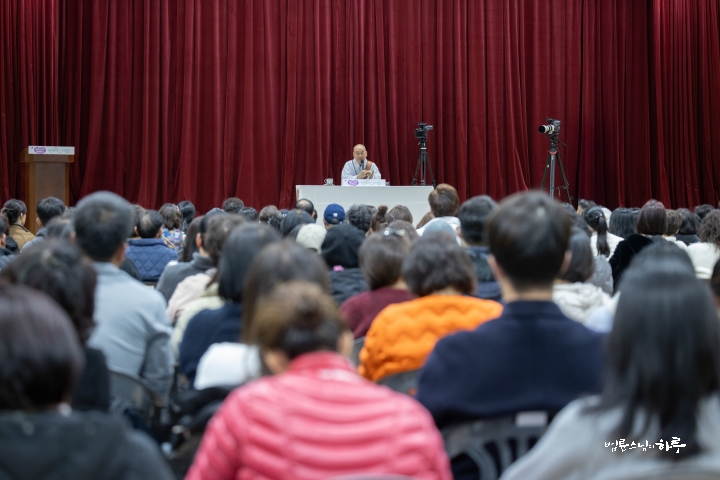
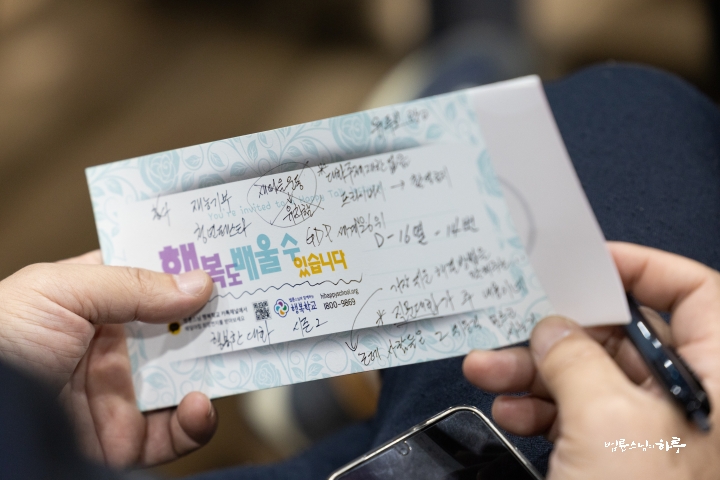
The program created to share this perspective is the ‘Happiness School.’ In terms of social systems, we need to strengthen our social safety net by providing allowances for the elderly, improving care facilities, offering unemployment benefits for those who lose their jobs, providing housing for those with housing difficulties, and supporting children’s education costs. Our country still lacks in these areas of support. However, social support alone is not sufficient because there are areas the government cannot address. To increase national happiness levels, we also need civic movements at the grassroots level. The ‘Happiness School’ program was created not to propagate Buddhism or grow Jungto Society, but to help all citizens live happy lives through a national movement. In other words, the purpose is to increase our own happiness levels. Today’s lecture is also an extension of this effort. Do you think the Happiness School has helped alleviate people’s suffering even a little? Do you think it has contributed to lowering our society’s suicide rate?”
“Yes!”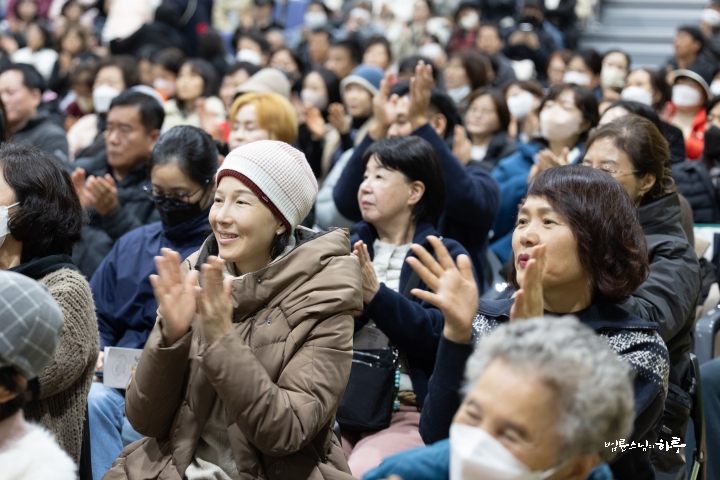
What Korea Needs Now Is a New Mind Movement Beyond the New Village Movement
“The Happiness School transcends religion and focuses solely on increasing life satisfaction. While the government’s role is necessary for us to live happily, it’s equally important for the private sector to create this national happiness movement together. That’s why today’s lecture is also free. The lectures are free, and all the workers are volunteers. For this movement to continue, the help of volunteers is essential. We need hands to promote, guide, and facilitate. Did you see the volunteers guiding you at the entrance on your way here? Thanks to so many volunteers, this movement continues. I hope you will also participate in such volunteer activities in the future. Rather than just looking to the government and complaining, we must do what we can do ourselves.
The sustainable development project I’m currently conducting in Bhutan follows the same approach. We provide materials needed to build or repair houses, but residents build them themselves. Whether they build well or poorly, they do it themselves. When we provide cement, residents pave the roads themselves; when we provide wire mesh, they put up fences themselves and farm. We don’t provide support if they just ask us to ‘do it for them.’ We only help when they say, ‘If you just provide support, we’ll do it ourselves.’ The idea is to make our own homes comfortable to live in and make our villages good places to live. It’s similar to the New Village Movement we had in Korea. 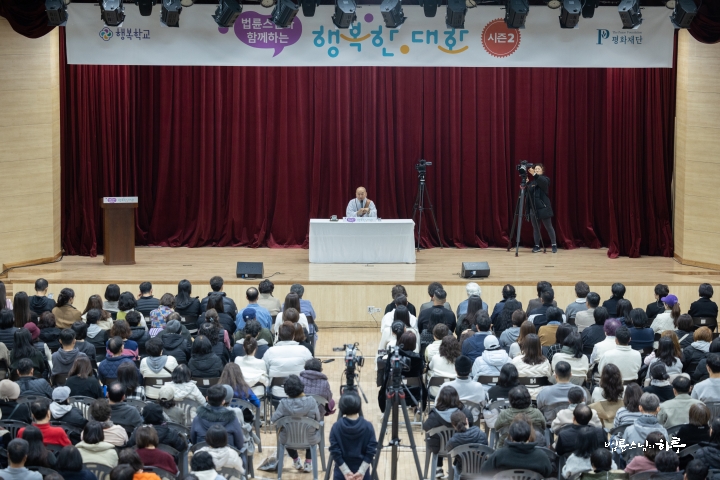
However, what South Korea needs now is not a material Saemaul Movement, but a spiritual one. It’s about creating our own happiness and building our collective happiness together. This could be called a ‘New Mind Movement’ that goes beyond the Saemaul Movement. There’s no need to blame our suffering on sins from past lives or despair thinking it’s God’s punishment. Why would God punish us? We must make ourselves happy. That’s why I started this movement.”
Next, those who had submitted questions in advance were given the opportunity to ask their questions. First, six people took turns raising their hands and asking Sunim questions. Then questions were also taken from the audience. One person shared that the pressure to “do well” in a performance-driven life was causing them to lose peace of mind, and asked Sunim for advice on how to balance inner peace with passion while living in a competitive environment. 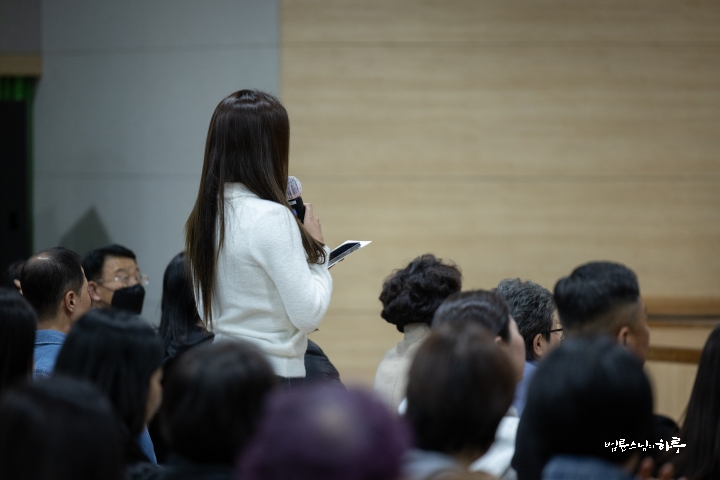
Is There a Way to Maintain Peace of Mind Under the Pressure to Perform Well?
“Have you quit sports? Are you still active?”
“I’m still active.”
“Then you’re in a situation where you need to produce results?”
“Yes.”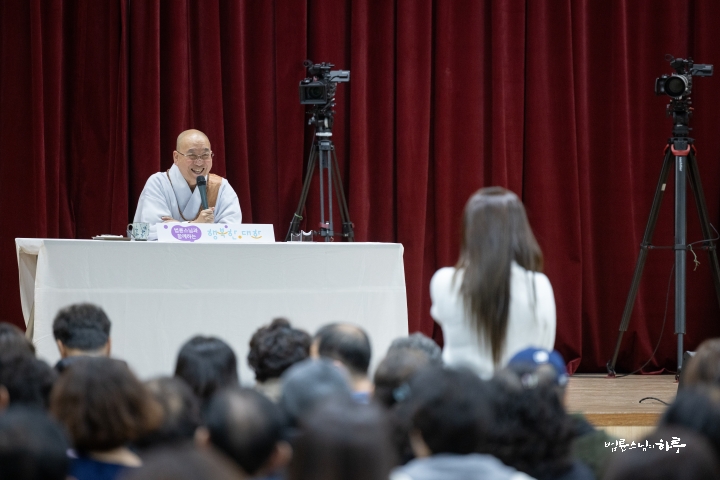
“Then you have no choice but to be performance-oriented. If it’s too hard, you can quit, or you can continue. You’ve been doing it for 20 years—isn’t that enough? What more do you want to do? Is it that you haven’t made enough money yet?”
“It’s a sport I love doing, but since it became my profession, I think I’m putting more pressure on myself.”
“When you produce results, you gain fame and make money. But when you first started, did you do it for money or because it was fun?”
“I started because it was fun.”
“Did you do it to become popular or because it was fun?”
“I did it because it was fun, but as I continued, popularity and money naturally followed.”
“That’s right. If you maintain the perspective of ‘I started because it was fun,’ you won’t become impatient. You started for fun, and as a result, popularity and money came. But now you’re attached to the popularity and money, so the fun has disappeared and only the burden remains. In other words, you’ve put the cart before the horse. Try going back to your original intention. Back then, nobody paid you to play sports. Now when you play, you make money and gain popularity. You’re currently attached to the results—popularity and money. You had fun doing it and the results followed, but now you’re attached to the results, so the fun has disappeared and only the burden of ‘having to do well’ remains. It would be good to let go of that attachment and return to the perspective of having fun.” 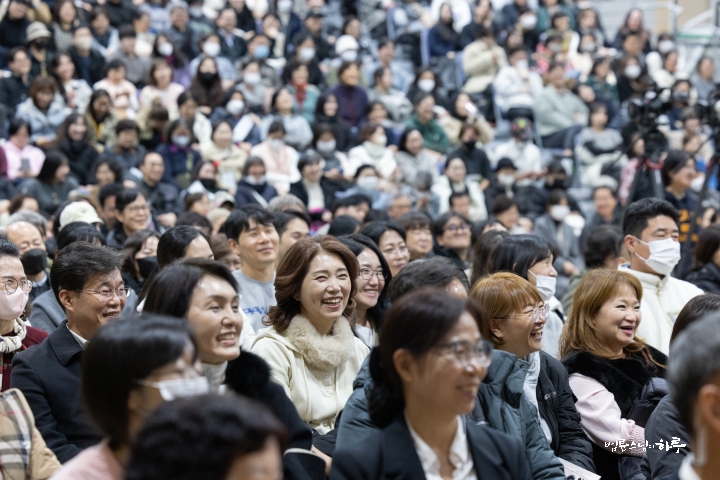
“Of course, I need to perform well to earn prize money, but if my goal was just popularity and money, it might make more sense to retire. However, I continue because I have a passion for the sport itself. It’s just that the results aren’t matching my efforts, which makes it difficult.”
“Do you think records will keep improving indefinitely just by continuing to practice? They improve up to a certain level, but there comes a point when they decline with age. Yet you’ve been doing this sport for 20 years and still expect your performance to keep improving. Will your records continue to get better even when you’re 60 after doing this for 40 or 50 years?”
“That’s not realistic. There are age-related limitations, and I have to compete with younger athletes to survive.”
“You’ve already gained popularity and money, so what does it matter if younger athletes are a bit more popular than you? You should be able to watch them succeed with joy. If you can’t feel happy for them, it’s because you want to keep holding onto that position. I’d like to suggest that you don’t necessarily retire but continue playing your sport lightly, as if it were play. You need to exercise anyway. It’s necessary for your health, and most importantly, it’s something you love.
When you were earning a million won at your peak and now earn 500,000 won, it can feel disappointing. But think back to when you first earned 100,000 won. You were probably thrilled with that 100,000 won. It’s hard because you’ve gone from a million to 500,000, but actually, 500,000 is five times 100,000. Looking at it from this perspective makes your heart much lighter. Continuing to enjoy your sport like you did in the beginning is one approach. Holding onto past standards of ‘how good I once was’ and trying to exceed them might be greed. It’s better to let go of those standards and enjoy it lightly.”
“As an athlete, I put in a lot of effort. I believe that if I’m faithful to the process, results will naturally follow, but when I get nervous during competitions, the results often don’t match my efforts.”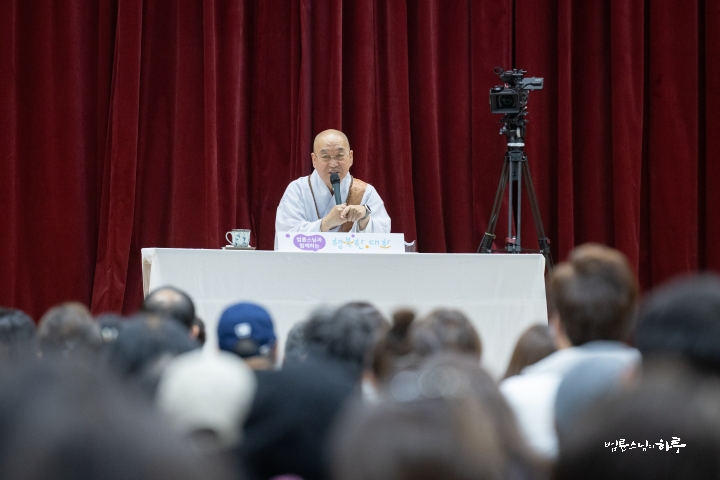
“Isn’t getting nervous itself a sign that you’re too attached to the results? Let me give you an example with food. You buy ingredients, cook, and eat – what’s the final product? Poop. (laughter) You know the saying ‘take a dump and don’t look back,’ right? Why don’t we look back? Because we’ve already enjoyed all the pleasure and gained all the energy through choosing ingredients, cooking, eating, and digesting. The poop is just waste.
From this perspective, the joy of practicing, the sense of achievement as your skills improve, the changes as your body becomes healthier – all these processes are already life itself. The final outcomes – prize money, popularity, records – are ultimately like poop. Right now, you’re obsessing over that poop. It’s like worrying, ‘Why is it so runny?’ or ‘Why is there so little?’ But you’ve already experienced all of life’s value through the process.
Once, an artist had kept clay sculptures he’d made over 20 years at home, but one day his house flooded and all the works melted away. As he was crying and wailing, I told him, ‘You’re obsessing over poop right now.’ While we cherish the results, from life’s perspective, they’re just remnants we leave behind while living. Similarly, I think of trophies and medals as poop too. Competing and exercising themselves are life. Don’t be too attached to results; enjoy each step of the process. 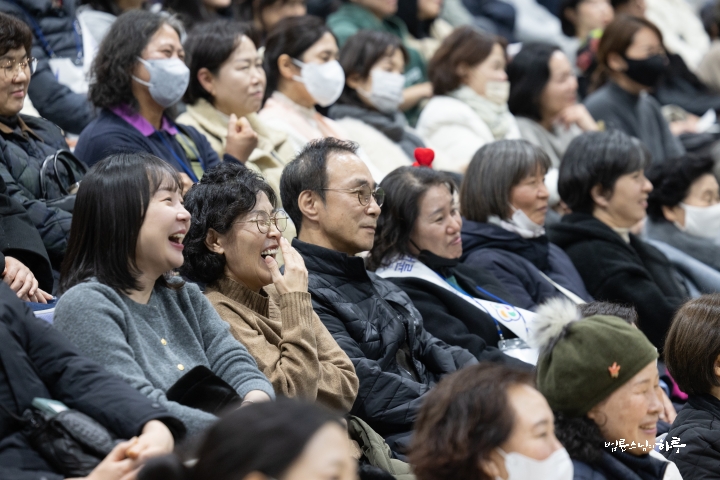
Athletes, actors, and singers who live in a world of competition and evaluation may appear enviable from the outside, but they themselves may not be as happy. This is because they live in constant tension. What’s important is learning to enjoy the process. It’s not easy, but only when you overcome this and look at your life from an ordinary perspective can you truly say, ‘I am living my own life.’ Otherwise, like autumn leaves swaying in the wind of public attention, you can be swept away by public interest, and when that illusion breaks, life can become very difficult. So don’t be too attached to results. This doesn’t mean you should do things carelessly, but rather you need an attitude of always doing things ‘as if practicing.'”
“Thanks to your words, Sunim, I was able to reconfirm the direction of my life. Thank you.”
Questions continued to follow.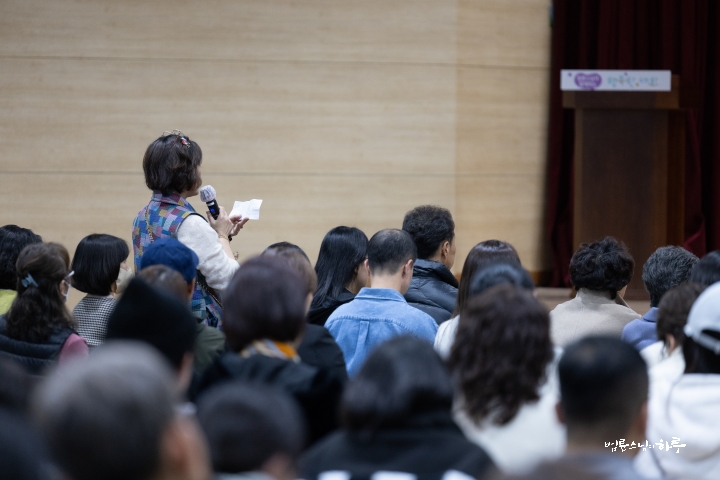
I’m often hurt by my husband’s words and actions, and despite trying various methods to change him, nothing has worked. I feel frustrated. How can I make my relationship with my husband healthier and more peaceful?
My daughter is self-harming and smoking, and we’ve completely stopped communicating. What should I do first to restore my relationship with my daughter and help her become healthy?
After a conflict with my father, we haven’t spoken for three years, and he refuses to meet me. How can I restore this severed relationship with my father?
My mother-in-law’s words and actions keep making me feel like ‘I’m not part of the family,’ and this disappointment continues to build up, shaking my heart. How should I observe and resolve these emotions?
My husband has been drinking for over 30 years and is losing his health, but there’s no change. Watching him every day, I’m becoming exhausted too. How should I approach this situation when I’m torn between wanting to give up and feeling angry?
After two hours of dialogue, Sunim gave his closing remarks.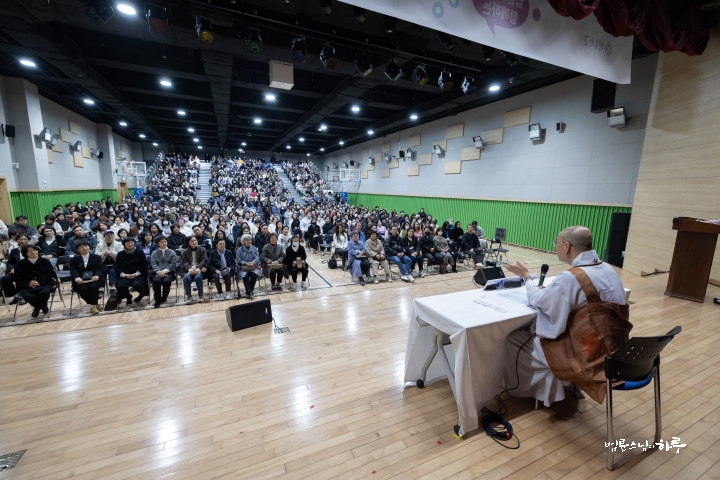
“What is the greatest enlightenment in this world? It’s knowing that ‘it’s no big deal.’ When you look closely at many things in life, they often turn out to be no big deal. A step below this enlightenment is realizing, ‘Ah, I can do it this way,’ and finding the solution yourself. But we usually mistake this ‘finding solutions’ for the greater enlightenment. In fact, knowing that there was no problem in the first place is a greater enlightenment than finding answers. In Buddhism, we call this ‘all dharmas are empty.’ When we say ‘all dharmas are empty,’ it sounds like a profound teaching, but when I say ‘it’s no big deal,’ you might wonder why I’m saying such things. Of course, even if I say ‘it’s no big deal,’ it may still feel like a big deal to you. Just because I say it’s no big deal doesn’t immediately make it so. I’m simply having conversations in various ways to help you realize for yourself, ‘Ah, it really is no big deal.’ Only when you yourself realize it’s no big deal does it truly become no big deal.
The Greatest Enlightenment in Life Is Ultimately ‘It’s No Big Deal’
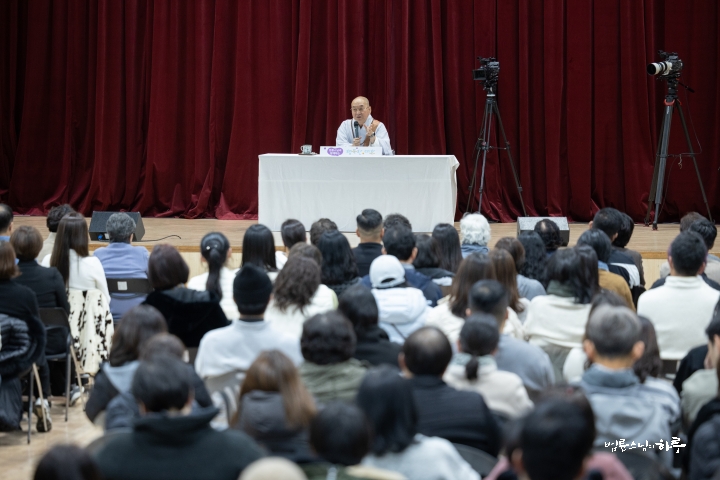
Even when something feels like a big deal in life, if you look carefully, you often find ‘I can just leave it be’ or ‘It’ll be over if I just apologize.’ Even the most difficult things in life feel much lighter when you look at them with a bit of humor. Don’t think too seriously about everything. This doesn’t mean to take problems lightly, but rather to have an attitude of looking at things from a distance. What seems like a big problem at first glance often turns out to be no big deal when you look closely. It’s like fog or ghosts that seem to exist from afar but disappear when you get close. The Buddhist saying ‘form is emptiness, emptiness is form’ means ‘what seems to exist at first glance doesn’t exist when you look closely.’ Looking closely means being awakened, while glancing superficially means being ignorant. We need this perspective to live without suffering. I hope all of you will adopt this perspective and become happier every day.”
The lecture ended with loud applause.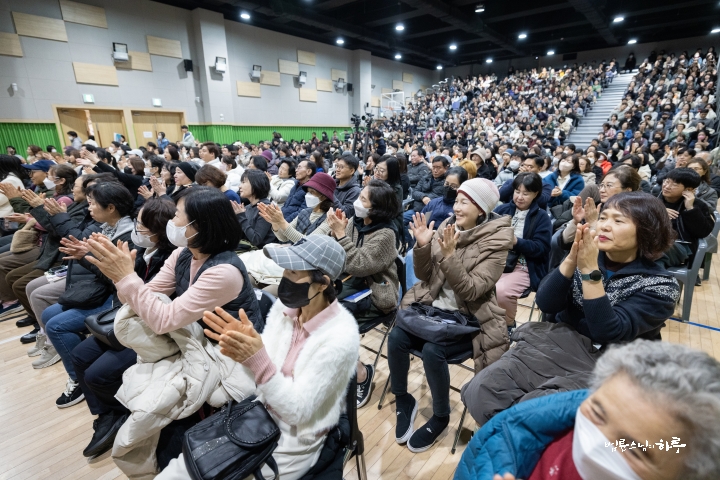
Immediately after, a book signing session began on stage. Most of the audience members held a book in their hands and received Sunim’s signature.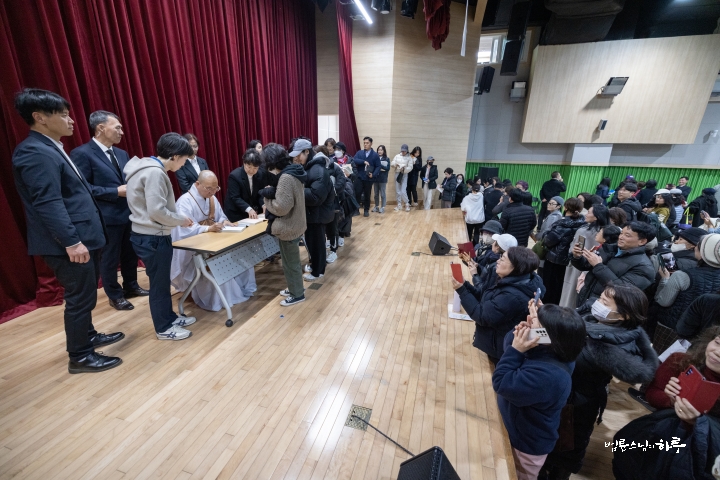
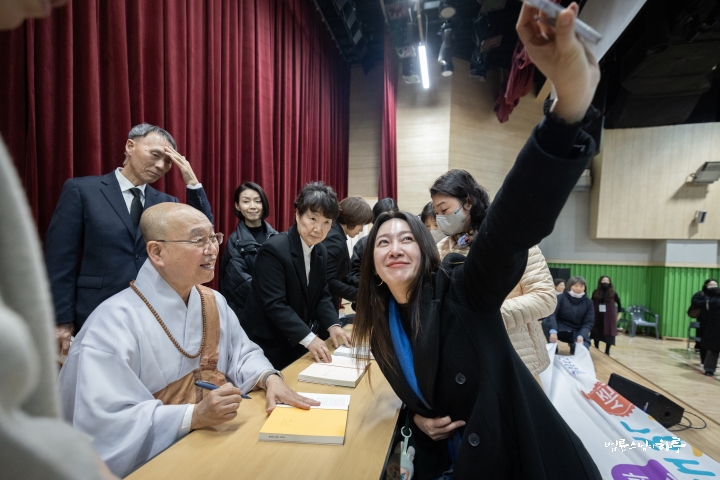
“Sunim, could you write my name too?”
“I write my name, and you write your name.” (laughter)
Many people stood in a long line, but Sunim signed books at a rapid pace. Many people expressed their gratitude, saying their lives had become happier thanks to Sunim.
After all the audience members had left the venue, Sunim took a commemorative photo with the Happy Citizens of Goyang City who had prepared the lecture.
“The Goyang lecture ended well. Let’s go to Happiness School!”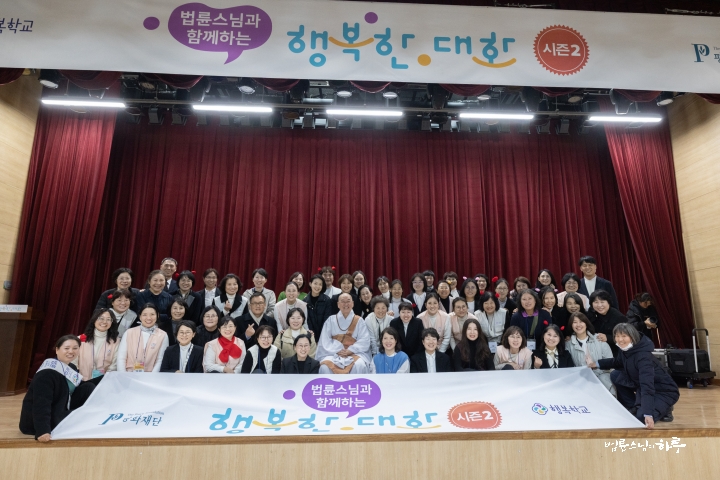
The faces of the volunteers who successfully completed the lecture were full of smiles. After expressing his gratitude to the volunteers, Sunim left the venue.
“Thank you all for your hard work.” 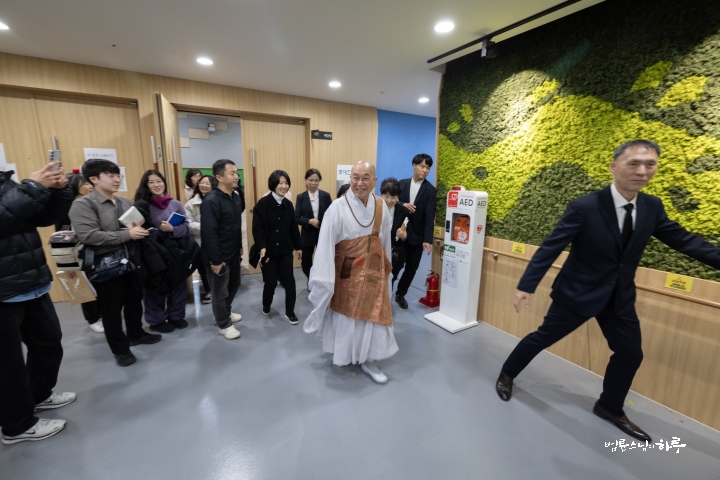
Leaving Goyang City at 10 PM, Sunim traveled by car for an hour and arrived at Seoul Jungto Center at 11 PM, concluding his day’s activities.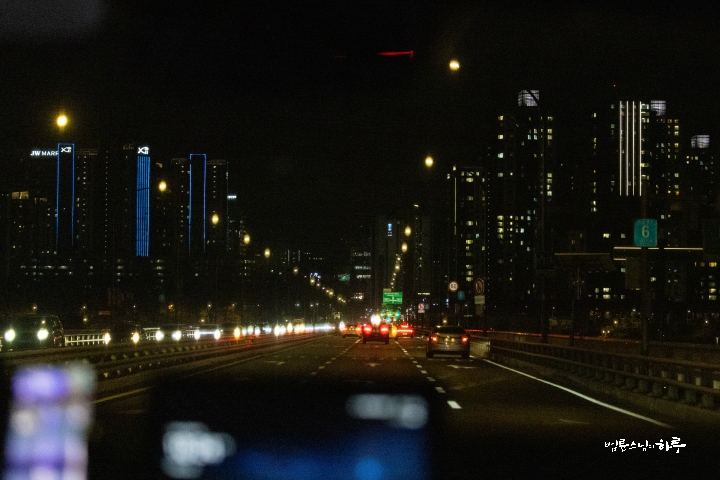
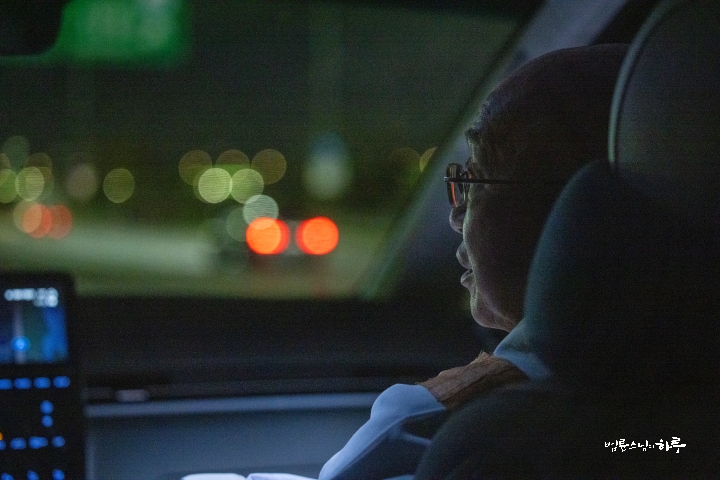
Tomorrow, after conducting the morning Weekly Dharma Assembly, he will attend a research seminar on ‘Climate Change and Arctic Routes’ in the afternoon, meet with the Peace Foundation planning committee members, and then conduct the evening Weekly Dharma Assembly.




